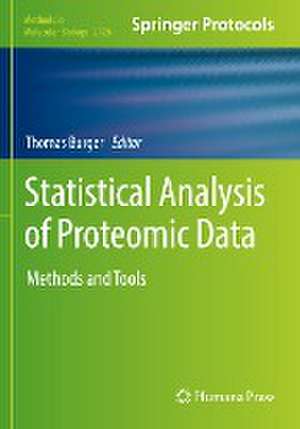Statistical Analysis of Proteomic Data: Methods and Tools: Methods in Molecular Biology, cartea 2426
Editat de Thomas Burgeren Limba Engleză Paperback – 30 oct 2023
Authoritative and practical, Statistical Analysis of Proteomic Data: Methods and Tools serves as an ideal guide for proteomics researchers looking to extract the best of their data with state-of-the art tools while also deepening their understanding of data analysis.
| Toate formatele și edițiile | Preț | Express |
|---|---|---|
| Paperback (1) | 900.01 lei 6-8 săpt. | |
| Springer Us – 30 oct 2023 | 900.01 lei 6-8 săpt. | |
| Hardback (1) | 1234.32 lei 6-8 săpt. | |
| Springer Us – 30 oct 2022 | 1234.32 lei 6-8 săpt. |
Din seria Methods in Molecular Biology
- 9%
 Preț: 791.63 lei
Preț: 791.63 lei - 23%
 Preț: 598.58 lei
Preț: 598.58 lei - 20%
 Preț: 882.98 lei
Preț: 882.98 lei -
 Preț: 252.05 lei
Preț: 252.05 lei - 5%
 Preț: 802.70 lei
Preț: 802.70 lei - 5%
 Preț: 729.61 lei
Preț: 729.61 lei - 5%
 Preț: 731.43 lei
Preț: 731.43 lei - 5%
 Preț: 741.30 lei
Preț: 741.30 lei - 5%
 Preț: 747.16 lei
Preț: 747.16 lei - 15%
 Preț: 663.45 lei
Preț: 663.45 lei - 18%
 Preț: 1025.34 lei
Preț: 1025.34 lei - 5%
 Preț: 734.57 lei
Preț: 734.57 lei - 18%
 Preț: 914.20 lei
Preț: 914.20 lei - 15%
 Preț: 664.61 lei
Preț: 664.61 lei - 15%
 Preț: 654.12 lei
Preț: 654.12 lei - 18%
 Preț: 1414.74 lei
Preț: 1414.74 lei - 5%
 Preț: 742.60 lei
Preț: 742.60 lei - 20%
 Preț: 821.65 lei
Preț: 821.65 lei - 18%
 Preț: 972.30 lei
Preț: 972.30 lei - 15%
 Preț: 660.49 lei
Preț: 660.49 lei - 5%
 Preț: 738.41 lei
Preț: 738.41 lei - 18%
 Preț: 984.92 lei
Preț: 984.92 lei - 5%
 Preț: 733.29 lei
Preț: 733.29 lei -
 Preț: 392.60 lei
Preț: 392.60 lei - 5%
 Preț: 746.26 lei
Preț: 746.26 lei - 18%
 Preț: 962.66 lei
Preț: 962.66 lei - 23%
 Preț: 860.22 lei
Preț: 860.22 lei - 15%
 Preț: 652.64 lei
Preț: 652.64 lei - 5%
 Preț: 1055.50 lei
Preț: 1055.50 lei - 23%
 Preț: 883.87 lei
Preț: 883.87 lei - 19%
 Preț: 491.89 lei
Preț: 491.89 lei - 5%
 Preț: 1038.86 lei
Preț: 1038.86 lei - 5%
 Preț: 524.16 lei
Preț: 524.16 lei - 18%
 Preț: 2122.34 lei
Preț: 2122.34 lei - 5%
 Preț: 1299.23 lei
Preț: 1299.23 lei - 5%
 Preț: 1339.12 lei
Preț: 1339.12 lei - 18%
 Preț: 1390.26 lei
Preț: 1390.26 lei - 18%
 Preț: 1395.63 lei
Preț: 1395.63 lei - 18%
 Preț: 1129.65 lei
Preț: 1129.65 lei - 18%
 Preț: 1408.26 lei
Preț: 1408.26 lei - 18%
 Preț: 1124.92 lei
Preț: 1124.92 lei - 18%
 Preț: 966.27 lei
Preț: 966.27 lei - 5%
 Preț: 1299.99 lei
Preț: 1299.99 lei - 5%
 Preț: 1108.51 lei
Preț: 1108.51 lei - 5%
 Preț: 983.76 lei
Preț: 983.76 lei - 5%
 Preț: 728.16 lei
Preț: 728.16 lei - 18%
 Preț: 1118.62 lei
Preț: 1118.62 lei - 18%
 Preț: 955.25 lei
Preț: 955.25 lei - 5%
 Preț: 1035.62 lei
Preț: 1035.62 lei - 18%
 Preț: 1400.35 lei
Preț: 1400.35 lei
Preț: 900.01 lei
Preț vechi: 1097.57 lei
-18% Nou
Puncte Express: 1350
Preț estimativ în valută:
172.22€ • 184.16$ • 143.59£
172.22€ • 184.16$ • 143.59£
Carte tipărită la comandă
Livrare economică 18 aprilie-02 mai
Preluare comenzi: 021 569.72.76
Specificații
ISBN-13: 9781071619698
ISBN-10: 1071619691
Pagini: 393
Ilustrații: XI, 393 p. 527 illus., 477 illus. in color.
Dimensiuni: 178 x 254 mm
Greutate: 0.7 kg
Ediția:1st ed. 2023
Editura: Springer Us
Colecția Humana
Seria Methods in Molecular Biology
Locul publicării:New York, NY, United States
ISBN-10: 1071619691
Pagini: 393
Ilustrații: XI, 393 p. 527 illus., 477 illus. in color.
Dimensiuni: 178 x 254 mm
Greutate: 0.7 kg
Ediția:1st ed. 2023
Editura: Springer Us
Colecția Humana
Seria Methods in Molecular Biology
Locul publicării:New York, NY, United States
Cuprins
Unveiling the Links between Peptide Identification and Differential Analysis FDR Controls by Means of a Practical Introduction to Knockoff Filters.- A Pipeline for Peptide Detection Using Multiple Decoys.- Enhanced Proteomic Data Analysis with MetaMorpheus.- Validation of MS/MS Identifications and Label-Free Quantification Using Proline.- Integrating Identification and Quantification Uncertainty for Differential Protein Abundance Analysis with Triqler.- Left-Censored Missing Value Imputation Approach for MS-Based Proteomics Data with Gsimp.- Towards a More Accurate Differential Analysis of Multiple Imputed Proteomics Data with mi4limma.- Uncertainty Aware Protein-Level Quantification and Differential Expression Analysis of Proteomics Data with seaMass.- Statistical Analysis of Quantitative Peptidomics and Peptide-Level Proteomics Data with Prostar.- msmsEDA and msmsTests: Label-Free Differential Expression by Spectral Counts.- Exploring Protein Interactome Data with IPinquiry: Statistical Analysis and Data Visualization by Spectral Counts.- Statistical Analysis of Post-Translational Modifications Quantified by Label-Free Proteomics Across Multiple Biological Conditions with R: Illustration from SARS-CoV-2 Infected Cells.- Fast, Free, and Flexible Peptide and Protein Quantification with FlashLFQ.- Robust Prediction and Protein Selection with Adaptive PENSE.- Multivariate Analysis with the R Package mixOmics.- Integrating Multiple Quantitative Proteomic Analyses Using MetaMSD.- Application of WGCNA and PloGO2 in the Analysis of Complex Proteomic Data.
Textul de pe ultima copertă
This book explores the most important processing steps of proteomics data analysis and presents practical guidelines, as well as software tools, that are both user-friendly and state-of-the-art in chemo- and biostatistics. Beginning with methods to control the false discovery rate (FDR), the volume continues with chapters devoted to software suites for constructing quantitation data tables, missing value related issues, differential analysis software, and more. Written for the highly successful Methods in Molecular Biology series, chapters include the kind of detail and implementation advice that leads to successful results.
Authoritative and practical, Statistical Analysis of Proteomic Data: Methods and Tools serves as an ideal guide for proteomics researchers looking to extract the best of their data with state-of-the art tools while also deepening their understanding of data analysis.
Caracteristici
Includes cutting-edge techniques Provides step-by-step detail essential for reproducible results Contains key implementation advice from the experts
